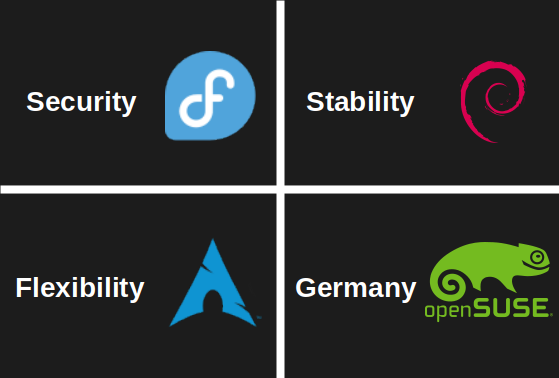this post was submitted on 13 Dec 2024
945 points (98.6% liked)
linuxmemes
21603 readers
474 users here now
Hint: :q!
Sister communities:
Community rules (click to expand)
1. Follow the site-wide rules
- Instance-wide TOS: https://legal.lemmy.world/tos/
- Lemmy code of conduct: https://join-lemmy.org/docs/code_of_conduct.html
2. Be civil
3. Post Linux-related content
sudo in Windows.4. No recent reposts
Please report posts and comments that break these rules!
Important: never execute code or follow advice that you don't understand or can't verify, especially here. The word of the day is credibility. This is a meme community -- even the most helpful comments might just be shitposts that can damage your system. Be aware, be smart, don't fork-bomb your computer.
founded 2 years ago
MODERATORS
you are viewing a single comment's thread
view the rest of the comments
view the rest of the comments

You're confusing security with privacy. While distros you mentioned are great for preventing ISPs and governments from spying on you (privacy), they're not really any better at preventing hackers from exploiting your vulnerable web server than fedora (security).
no, Qubes, Bazzite, Garuda were made with security in mind. Containerization, selinux enforcing, hash checks, address space layout randomization is also built in. These are all more secure than Fedora. Qubes for example, uses vm containers to completly isolate every app, so the system is almost impossible to compromise by malware or hacking. Bazzite uses immutable root file system, much like stock android. it may not along well with unix philosophies, but there isn't really a way for a malicious code to run with elevated privilages or to manipulate system files. Garuda automatically creates snapshota from the system, so if it is compromised, it can be rolled back quickly. Snapshots for external devices or cloud are supported as well. It uses zram compression on swap, this helps avoid data leakages to the disk, so makes sure that after a reboot, every session quits, since data from ram can't leak on the disk. it also uses firejail and chaotic aur sandboxing. There is a smaller support for secure boot too. So these are all highly secure operating systems. And to some degree, privacy and security overlap each other.
Yeah my bad, you're right. I got too stuck on tails, which is in my opinion more focused on privacy than security, and ignored everything else.
Tails in itself is reasonably secure too, but it was mostly designed for use with public computers and forensics, and ofc to conceal network activity that might seem suspicious. And it is a good solution if you need a portable linux, and your android phone is not a good choice for your use case.
How do they do that?
I'm not really expert in this topic, but as far as I know tails is amnesiac os that forgets everything on reboots for example. Both whonix and tails also routes your traffic through TOR which helps hiding your identity.
Concerning other mentioned distros and also security wise, this comment explains it lot better than I would: https://lemmy.zip/comment/15305364